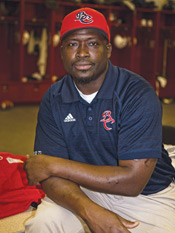
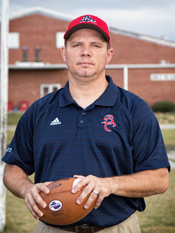 Heading into the 2013 season, the Brooks County Trojans were favorites to win the 2A state title. They returned a very talented nucleus of players, including All-Everything quarterback/defensive back Malcolm Parrish. Complementing Parrish was a group of skill guys who possessed ample talent of their own, making the Trojans one of the most formidable teams in the state in any classification. Then, just as things really got going in preseason workouts, The Accident happened. There is no need to rehash the tale or the outcome. Everyone knows it by now. It left a team, a community, an entire region stunned and saddened. Football was the farthest thing from people’s minds. The most pressing concern was for DeVron Whitfield, the accident’s lone survivor. A close second was the well-being of the rest of the Trojans. Something like this leaves an indelible imprint on young people. How would they respond, not only on the football field but also in their everyday lives?
Heading into the 2013 season, the Brooks County Trojans were favorites to win the 2A state title. They returned a very talented nucleus of players, including All-Everything quarterback/defensive back Malcolm Parrish. Complementing Parrish was a group of skill guys who possessed ample talent of their own, making the Trojans one of the most formidable teams in the state in any classification. Then, just as things really got going in preseason workouts, The Accident happened. There is no need to rehash the tale or the outcome. Everyone knows it by now. It left a team, a community, an entire region stunned and saddened. Football was the farthest thing from people’s minds. The most pressing concern was for DeVron Whitfield, the accident’s lone survivor. A close second was the well-being of the rest of the Trojans. Something like this leaves an indelible imprint on young people. How would they respond, not only on the football field but also in their everyday lives?
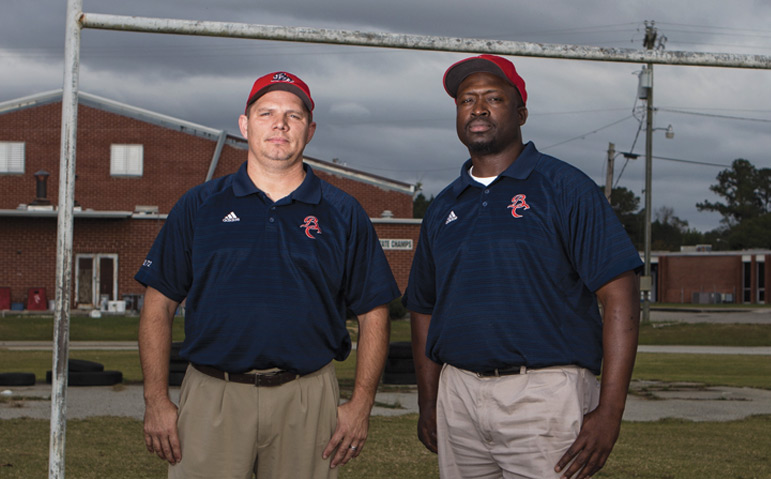 Coaches spend a great deal of time in training. They attend coaches clinics and are always looking for another perspective, another way of tweaking their systems to make them more efficient and successful. Those clinics, however, don’t teach how to deal with tragedies such as this. There is no blueprint, no study manual. These are lessons that must be learned on the fly.
Coaches spend a great deal of time in training. They attend coaches clinics and are always looking for another perspective, another way of tweaking their systems to make them more efficient and successful. Those clinics, however, don’t teach how to deal with tragedies such as this. There is no blueprint, no study manual. These are lessons that must be learned on the fly.
In the wake of the July tragedy, the players turned to their coaches first and foremost. The staff was on the front lines. They reacted to the accident would determine in large part how the players reacted. “In the aftermath, we communicated with the kids. [Head coach] Maurice [Freeman] met with everyone as a team and asked the kids what they wanted to do, if they wanted to play or if they wanted to take the season off. All of them said they wanted to play. They wanted the rest of that week off but they wanted to play,” recalls offensive coordinator Clifford Fedd.
Once the players were ready to get back to practice, the coaching staff had to set as much of a tone of normalcy as possible. It was important not to put too much pressure on the kids, to make them feel as if they had to play for their lost team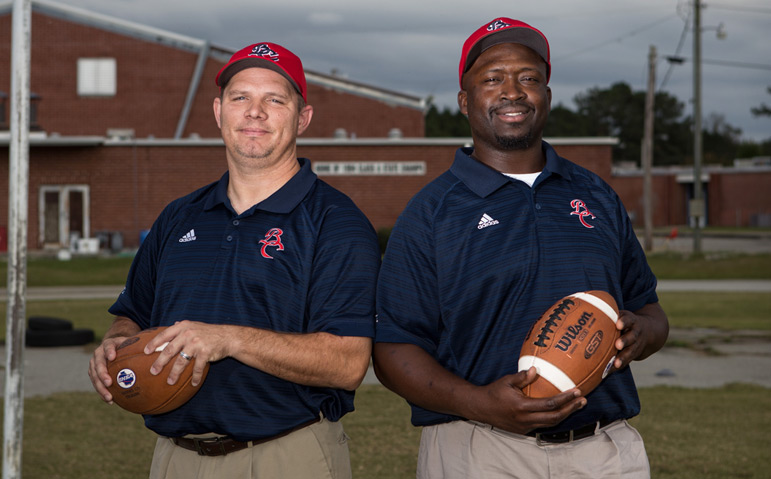 mates. Instead, the coaches told them to play hard for their fallen comrades, to remember them in everything they did on and off the field. “Sometimes we still get together and talk. We have to let the kids express themselves, let them say how they feel. We involve those guys we lost in everything. They are still very much a part of our team,” states Fedd.
mates. Instead, the coaches told them to play hard for their fallen comrades, to remember them in everything they did on and off the field. “Sometimes we still get together and talk. We have to let the kids express themselves, let them say how they feel. We involve those guys we lost in everything. They are still very much a part of our team,” states Fedd.
Freeman believes in letting his coaches coach. When the Trojans were ready to get back down to business, it was up to the coaching staff, most notably Fedd and defensive coordinator Richard Andrews, to make sure the players refocused on football and played the game the way they had been taught. It wasn’t easy but Fedd and Andrews were dealing with a veteran group of players, athletes who had been in the system since they were freshmen and knew exactly what to do. The defensive unit was familiar with Andrews’s 4-4 scheme and the offense knew Fedd’s spread inside and out. They just had to perfect what they had been taught for three years.
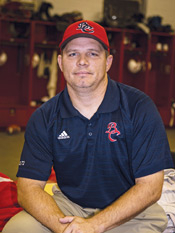 Andrews, a native of Florida, came to Brooks County from Rabun County. Before that, he was at Putnam County for seven years. He is in his sixth year with the Trojans; his arrival in Quitman coincided with Freeman’s. The 4-4 Andrews runs is a simple one. It’s easily adapted to defend the spread when needed. Though it may change from time to time, the differences aren’t huge and the players can follow the changes easily. “We don’t try to overload our kids with schemes. We try to put them in the right places and let them run. If we do that, they’ll make the plays,” he says. The Brooks County defense has allowed 193 points this season – a 19.3 average – and that includes the 50 points that 6A Valdosta hung on the Trojans early in the season. Take out that game and the Trojans have allowed just 143 points, a 16-point per game average. Brooks has played solid defense all year but hasn’t shut anyone out. “We’re going to find a way to let a team score six points. No matter what we do, that’s going to happen,” says Andrews.
Andrews, a native of Florida, came to Brooks County from Rabun County. Before that, he was at Putnam County for seven years. He is in his sixth year with the Trojans; his arrival in Quitman coincided with Freeman’s. The 4-4 Andrews runs is a simple one. It’s easily adapted to defend the spread when needed. Though it may change from time to time, the differences aren’t huge and the players can follow the changes easily. “We don’t try to overload our kids with schemes. We try to put them in the right places and let them run. If we do that, they’ll make the plays,” he says. The Brooks County defense has allowed 193 points this season – a 19.3 average – and that includes the 50 points that 6A Valdosta hung on the Trojans early in the season. Take out that game and the Trojans have allowed just 143 points, a 16-point per game average. Brooks has played solid defense all year but hasn’t shut anyone out. “We’re going to find a way to let a team score six points. No matter what we do, that’s going to happen,” says Andrews.
A football team never wants to give up points. But if you’re going to give up a point or two, it’s nice to have the kind of offense that can score seemingly at will. And the Trojans can do just that. The Brooks County offense has averaged over 34 points per game in 2013. When you’re giving up fewer than 20 and scoring more than 30, that’s a pretty good ratio to enjoy.
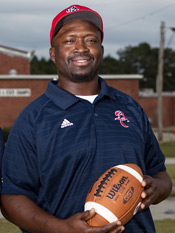 The Trojans run a spread attack that gets the ball in the hands of their playmakers. Originally a pro-I option offense, Freeman wanted to change things around a couple of years ago. Fedd, who had experience playing quarterback, wide receiver, and defensive back in college, came to Brooks County as a quarterbacks coach, and he knew the spread well. After playing two years at Riverside Community College in Riverside, California, Fedd played a year at Valdosta State until an injury ended his career. He knew the spread from VSU. After graduation, he worked at Berrien County under former head coach and VSU teammate Ryan Branch, who utilized the same kind of spread in his offenses. Together, Fedd and Freeman worked out the details of the spread. When the offensive coordinator position came open after the 2012 season, Fedd stepped in. His first year as coordinator has been quite an experience.
The Trojans run a spread attack that gets the ball in the hands of their playmakers. Originally a pro-I option offense, Freeman wanted to change things around a couple of years ago. Fedd, who had experience playing quarterback, wide receiver, and defensive back in college, came to Brooks County as a quarterbacks coach, and he knew the spread well. After playing two years at Riverside Community College in Riverside, California, Fedd played a year at Valdosta State until an injury ended his career. He knew the spread from VSU. After graduation, he worked at Berrien County under former head coach and VSU teammate Ryan Branch, who utilized the same kind of spread in his offenses. Together, Fedd and Freeman worked out the details of the spread. When the offensive coordinator position came open after the 2012 season, Fedd stepped in. His first year as coordinator has been quite an experience.
The players adapted to the spread well. Now, after a couple of years in the system, they know it well. And having a player like Parrish running the offense doesn’t hurt. “This is a special group. A lot of times, our practices run themselves. We just guide them through. After all this time, they know the system,” says Fedd.
Both coaches believe in working hard while building relationships with their players at the same time. They don’t want to push the players so hard that they alienate them. Playing football at Brooks County can be a pressure cooker. Expectations are high and the level of play had better match those expectations. “We expect to make a run every year. It doesn’t matter who we have or who we play. Next year, we’re going to lose a lot of players and a lot of people aren’t going to give us a chance. But we’re not going to lower our expectations,” says Andrews. “My job is to love, discipline, and show them the right way to do things. If I do those things, the kids will respond. I treat them like they’re my own sons.”
“The thing I always ask myself is, am I doing my best to prepare these players? Have I prepared myself? I listen to the players and try to let them do what they like. If they’re doing what they enjoy, they’ll make plays,” says Fedd.
Andrews and Fedd would one day like to test the head coaching waters but they aren’t looking for a job anytime soon. They recognize that they have a good thing at Brooks County and they want to enjoy it and keep it going for as long as possible. “Would I like to be a head coach one day? Sure. But I am very happy where I am right now. I’m happy with the players, the staff, my head coach, my athletic director, everyone,” says Andrews.
Fedd agrees. “I’m not in a hurry to do anything. If the opportunity comes up, I’ll consider it at that time. But right now, I’m the offensive coordinator at Brooks County High and I enjoy it immensely.”
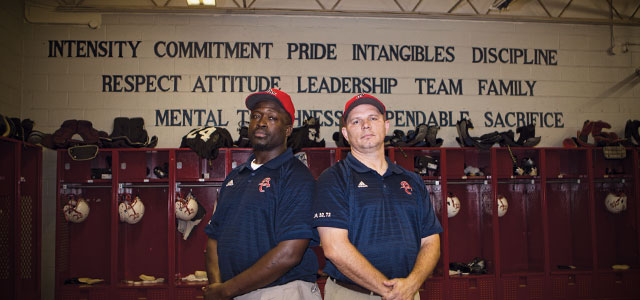
Both men are from Florida and made their way to Brooks County through Valdosta State University. Richard Andrews graduated from Dunnellon High School in Dunnellon, Florida. He played college football at Lindenwood University in St. Charles, Minnesota. After one year at Lindenwood, he left school and eventually graduated from VSU. Clifford Fedd graduated from Paxon Senior High School in Jacksonville, Florida, and made the aforementioned trip to Riverside Community College then to VSU. Now the Florida natives are leading one of the best high school football teams in Georgia.
Coach’s Corner/South Georgia/December 2013
Richard Andrews and Clifford Fedd
Brooks County High School
Quitman, Georgia
Robert Preston Jr.
Photography by Micki K Photography
Brooks County coordinators orchestrate region-winning schemes


